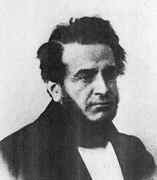Person: Rodrigues, Benjamin Olinde

Olinde Rodrigues was a French mathematician best known for his formula for the Legendre polynomials.
Mathematical Profile (Excerpt):
- We certainly know that he did not use his first name Benjamin and was known as Olinde Rodrigues.
- Olinde was not one of his given names.
- At this point Olinde was added to Rodrigues names.
- Sometimes in later life he used the name Benjamin-Olinde.
- Olinde entered the Lycée Impérial (now the Lycée Louis-le-Grand) in Paris.
- Chasles was a contemporary of Olinde at the Lycée Impérial and both sat the entrance examinations for the École Polytechnique and École Normale in 1811.
- Rodrigues was ranked first in the competitive examination while Chasles was ranked second.
- In 1812 (at the age of 17) Olinde was a class assistant for the mathematics course at the Lycée Napoleon.
- The École Polytechnique was the most famous of the Paris universities and most historians suggest that Rodrigues could not attend it as he was a Jew.
- Despite coming top in the entrance examination, Rodrigues chose to enter neither of the two famous Écoles, instead entering the University of Paris.
- By private arrangement, Rodrigues tutored a student of mathematics at the École Polytechnique, Prosper Enfantin, and the two would later jointly lead a socialist movement.
- Rodrigues published his results in Memoir on the attraction of spheroids.
- Rodrigues was involved with the Claude Henri de Rouvroy, the Comte de Saint-Simon, who was an early advocate of socialism.
- Saint-Simon was, like Rodrigues, a rich man who had made money during the French Revolution.
- Rodrigues was attracted by Saint-Simon's ideas of social reform and was a staunch supporter.
- In 1823 Saint-Simon attempted to kill himself but Rodrigues came to his rescue, nursed him back to health, and provided him with the necessary financial support to see out the rest of his life.
- Rodrigues was one of two joint leaders of the Saint-Simonian School, the other being his former student Prosper Enfantin.
- Rodrigues argued that working men were kept poor by lending at interest and by inheritance.
- Saint-Simon had been persuasive indeed to have the banker Rodrigues argue against lending without interest! Rodrigues also argued in favour of mutual aid societies and profit-sharing for workers.
- By 1832 Enfantin began to argue for extreme views, particularly on sexual freedom, which went further than Rodrigues was prepared to go and Rodrigues left the Saint-Simonian School, declaring himself the true disciple of Saint-Simon.
- In August 1832 Rodrigues was arrested and charged with organising illegal meetings and outraging public morality.
- Rodrigues joined the Paris Ethnological Society.
- These views were much criticised by other members of the Paris Ethnological Society who argued that Rodrigues was being sentimental and that science proved that he was wrong.
- Rodrigues' composition of rotations is basically the composition of unit quaternions.
- The story of the Rodrigues formula for Legendre polynomials is somewhat more complicated due to the fact that Rodgigues' paper on the subject does not appear to have been noticed at the time, or if it was then it was quickly forgotten.
- They did not know of the earlier paper of Rodrigues and as a result the formula became known as the Ivory-Jacobi formula for some time.
- However, in 1860, Hermite came across the original paper by Rodrigues.
- The fact that we know it today as the Rodrigues formula is due to Heine.
- Heine was an expert on Legendre polynomials, Lamé functions and Bessel functions and he wrote a book in which he proposed that, since Hermite had shown that Rodrigues had priority in discovering the formula, then it should be known as the Rodrigues formula.
- Heine always used that name from then on and through him we call the formula the Rodrigues formula today.
- There was another discovery by Rodrigues which was only brought to light in 1970.
- These ideas are now important in group theory and group representation theory, but sadly Rodrigues did not influence this work as his results were missed until 1970 when Leonard Carlitz discovered Rodrigues' contribution.
- Really Rodrigues was remarkably poorly appreciated by his contemporaries both as a mathematician, where he showed remarkable intuition in studying important problems, and as a social reformer where many of his views have at last become the accepted ones.
- In that year the Franconia was sold to the French Line (Compagnie Generale Transatlantique) and renamed the Olinde Rodrigues.
- As a second footnote, we remark that Rodrigues has many incorrect references to him in the mathematical literature.
- Élie Cartan thought that Olinde Rodrigues was two separate people, one called Olinde and one called Rodrigues.
Born 6 October 1795, Bordeaux, France. Died 17 December 1851, Paris, France.
View full biography at MacTutor
Thank you to the contributors under CC BY-SA 4.0! 

- Github:
-

- non-Github:
- @J-J-O'Connor
- @E-F-Robertson
References
Adapted from other CC BY-SA 4.0 Sources:
- O’Connor, John J; Robertson, Edmund F: MacTutor History of Mathematics Archive
